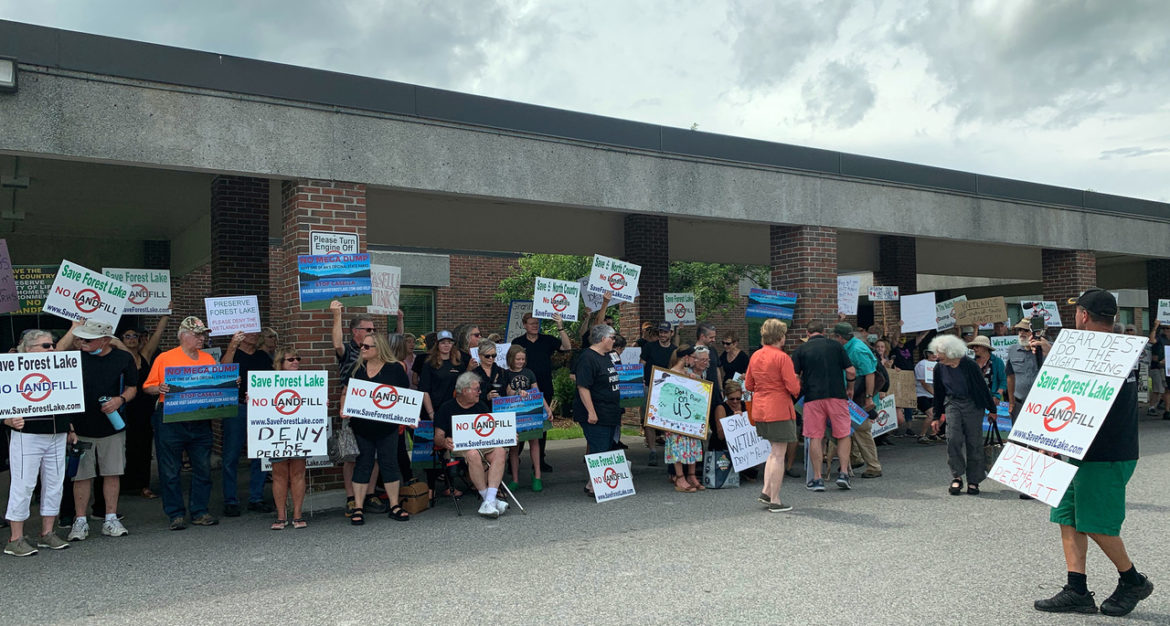By Thomas P. Caldwell, InDepthNH.org
DALTON — John Casella, chair and chief executive officer of Casella Waste Systems, Inc., has withdrawn Granite State Landfill’s application for a wetlands permit for the company’s proposed landfill in Dalton, but he said the project remains vitally important “and we intend to see it through to completion.”
In a Dec. 10 letter to Pamela Monroe, the legal unit administrator for the N.H. Department of Environmental Services, Attorney Bryan Gould said, “in light of field work and reports recently requested by federal regulators as part of GSL’s forthcoming federal applications, and NHDES’ preference to coordinate application review with that of its federal counterparts, GSL is withdrawing its pending wetlands permit application ….”
His letter continues, “GSL plans to file a new wetlands permit application in 2022 contemporaneously with applications for a Section 404 permit from the Army Corps of Engineers, a Section 401 certification, and a New Hampshire Alteration of Terrain permit.”
Monroe confirmed that the withdrawal renders moot the state’s extension agreement with GSL. Under that Oct. 26 agreement, the state extended the existing permit application for another year, even though a “final hearing” had taken place in July.
The extension had fueled speculation among opponents of the landfill that “the deal was fixed” between the state and Casella Waste Systems, GSL’s parent company. In light of the overwhelming public opposition to the landfill, as well as the company’s failure to address many of the issues the DES had raised, the wetlands permit appeared doomed for failure if a decision were to be rendered by the original deadline set by statute. By granting an extension that opponents claimed was illegal under state regulations, the state was giving the company additional time to fix the problems.
In his Dec. 10 letter to the residents of Dalton, John Casella said, “This decision [to withdraw the permit] was not made lightly as it comes at a significant cost to our company, but it was made for several reasons.”
He cited the DES’ interest in coordinating its review of the permits necessary for the landfill — wetlands, alteration of terrain, air quality, and other state requirements, along with the federal permits — and said it also allows the company “to take into consideration the public opinion that we have gathered, and will continue to solicit, throughout this process.”
Additionally, he said, GSL will be able to perform the additional field work required by the multiple permit applications.
“We have confidence in our permitting and compliance teams, our third-party consultants, the agencies who regulate our facilities, and the process that places the interests of our customers and the communities we serve at the forefront,” Casella wrote.
He acknowledged, “Those who have opposed this project from the outset will broadcast their own viewpoint about the process and the project,” but added, “the reality is that New Hampshire will be facing a waste disposal capacity shortfall based on its current permitted capacity. Without the new landfill capacity in Dalton and recycling infrastructure in another part of the state that we have proposed, the cost to New Hampshire will be high both environmentally and economically.”
Jon Swan of Save Forest Lake responded to Casella’s letter, saying, “For two years now, public opposition against this project has been overwhelming, with property owners, citizens, town select boards, conservation commissions, state legislators, wetlands scientists, and environmental organizations from across the state, all weighing in against this project. How much public opinion and input does Mr. Casella need to gather before realizing that no one thinks his development project is a good idea?”
The landfill is slated for property adjacent to Forest Lake State Park and much of it is wetlands, important to wildlife. Another Casella landfill in the adjacent town of Bethlehem has been plagued with problems, including what is termed the state’s largest leachate spill, last May. Area residents are concerned that a new landfill so close to Forest Lake and the Ammonoosuc River could lead to widespread contamination.
They also point out that nearly half of the projected solid waste going to the landfill would originate out of state and say that, without that imported waste, New Hampshire would have plenty of landfill capacity for the foreseeable future.
The state has formed a solid waste review panel that will be working over the next five years to revise the state’s solid waste laws to catch up with the new technologies and methods neighboring states have already implemented to reduce the amount of waste going to landfills.
“This completely dismissive attitude of public opinion and concern by this company now, during what could be construed as the ‘dating or courting’ stage, speaks volumes relative to what’s to come if they ever get a foot in the door in Dalton,” Swan said. “As we’ve seen repeatedly in the numerous towns and cities that have played host to Casella’s landfill operations, this company will do whatever it wants to do to ensure corporate profitability, and the community be damned if they get in the way.”
T.P. Caldwell is a writer, editor, photographer, and videographer who formed and serves as project manager of the Liberty Independent Media Project. Contact him at liberty18@me.com.





